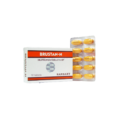Ibuprofen belongs to a group of drugs called nonsteroidal anti-inflammatory drugs (NSAIDs). These drugs (Advil, Motrin, Nuprin) temporarily reduce the amount of prostaglandins made by your body. Your body releases prostaglandins when you have an injury. These hormone-like substances contribute to inflammation, which includes swelling, fever, and increased sensitivity to pain.
Prescription ibuprofen is used to relieve pain, tenderness, swelling, and stiffness caused by osteoarthritis (arthritis caused by a breakdown of the lining of the joints) and rheumatoid arthritis (arthritis caused by swelling of the lining of the joints). It is also used to relieve mild to moderate pain, including menstrual pain (pain that happens before or during a menstrual period). Nonprescription ibuprofen is used to reduce fever and to relieve minor aches and pain from headaches, muscle aches, arthritis, menstrual periods, the common cold, toothaches, and backaches.
How Often Can You Take Ibuprofen
Prescription ibuprofen comes as a tablet to take by mouth. It is usually taken three or four times a day for arthritis or every 4 to 6 hours as needed for pain. Nonprescription ibuprofen comes as a tablet, chewable tablet, suspension (liquid), and drops (concentrated liquid). Adults and children older than 12 years of age may usually take nonprescription ibuprofen every 4 to 6 hours as needed for pain or fever. Children and infants may usually be given nonprescription ibuprofen every 6 to 8 hours as needed for pain or fever, but should not be given more than 4 doses in 24 hours. Ibuprofen may be taken with food or milk to prevent stomach upset. If you are taking ibuprofen on a regular basis, you should take it at the same time(s) every day.
Follow the directions on the package or prescription label carefully, and ask your doctor or pharmacist to explain any part you do not understand. Take ibuprofen exactly as directed. Do not take more or less of it or take it more often than directed by the package label or prescribed by your doctor.
Ibuprofen comes alone and in combination with other medications. Some of these combination products are available by prescription only, and some of these combination products are available without a prescription and are used to treat cough and cold symptoms and other conditions. If your doctor has prescribed a medication that contains ibuprofen, you should be careful not to take any nonprescription medications that also contain ibuprofen.
Swallow the tablet whole; do not chew or crush it. If you are giving ibuprofen or a combination product that contains ibuprofen to a child, read the package label carefully to be sure that it is the right product for a child of that age. Do not give ibuprofen products that are made for adults to children.
Before you give an ibuprofen product to a child, check the package label to find out how much medication the child should receive. Give the dose that matches the child’s age on the chart. Ask the child’s doctor if you don’t know how much medication to give the child.
Shake the suspension and drops well before each use to mix the medication evenly. Use the measuring cup provided to measure each dose of the suspension, and use the dosing device provided to measure each dose of the drops.
The chewable tablets may cause a burning feeling in the mouth or throat. Take the chewable tablets with food or water.
Stop taking nonprescription ibuprofen and call your doctor if your symptoms get worse, you develop new or unexpected symptoms, the part of your body that was painful becomes red or swollen, your pain lasts for more than 10 days, or your fever lasts more than 3 days. Stop giving nonprescription ibuprofen to your child and call your child’s doctor if your child does not start to feel better during the first 24 hours of treatment. Also, stop giving nonprescription ibuprofen to your child and call your child’s doctor if your child develops new symptoms, including redness or swelling on the painful part of his body, or if your child’s pain or fever gets worse or lasts longer than 3 days.
Do not give nonprescription ibuprofen to a child who has a sore throat that is severe or does not go away, or that comes along with fever, headache, nausea, or vomiting. Call the child’s doctor right away, because these symptoms may be signs of a more serious condition.
What Happens When You Take Too Much Ibuprofen?
According to reports many adults who use ibuprofen and other so-called nonsteroidal anti-inflammatory (NSAID) drugs take too much, increasing their risk of serious side effects like internal bleeding and heart attacks, a U.S. study suggests. About 15 percent of adults taking ibuprofen (Motrin, Advil) or other NSAIDs like aspirin, naproxen (Aleve), celecoxib (Celebrex), meloxicam (Mobic), and diclofenac (Voltaren) exceeded the maximum recommended daily dose for these drugs, the study found.
“NSAIDs are among the most commonly used medicines in the U.S. and worldwide,” said lead study author Dr. David Kaufman of Boston University. “These drugs can have serious side effects, including gastrointestinal bleeding and heart attacks, and are often taken without medical oversight because many products are available over-the-counter,” Kaufman said. “The attitude that users can choose their own dose regardless of label directions, along with poor knowledge of dosing limits, is associated with exceeding the daily limit,” he concluded.
How much ibuprofen is an overdose?
In order to avoid the potential short and long term side effects of taking too much ibuprofen, do not take more than your recommended dose. The absolute maximum daily dose for adults is 3200 mg. Do not take more than 800 mg in a single dose. Only use the smallest dose needed to alleviate your swelling, pain, or fever. ALSO READ: Can I Take Ibuprofen After Lip Filler?





